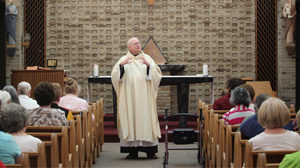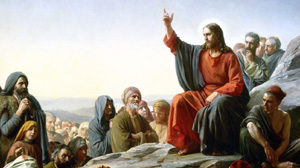Reflection:
So, the Gentile Christians were not worthy to be part of the Christian community?! In the Acts of the Apostles we hear Paul and Barnabas presenting a case whereby the Gentiles should be deemed worthy to enjoy full membership in the church. After all, as Peter further attested to, aren’t we all invited to be saved through faith in the power of Christ. During the Council of Jerusalem it was agreed that the Gentiles who observed certain stipulations dealing with dietary laws and circumcision were to be welcomed to the table of the Lord. What wonderful news this must have been to these people who genuinely wanted to be a part of the Christian community?
I have friends who have a hard time singing the lyrics to the song, ALL ARE WELCOME because they do not believe we practice what we preach as a church and in society as a whole! There seems to be a general lack of respect and welcome for people who have a different skin color, blood line, religious affiliation, thoughts, opinions or lifestyle than ours. Children and young adults are victims of cyber-bullying, people who have been born as a gay or lesbian suffer discrimination in the workplace, social networks and religious organizations. Families from war torn areas attempting to emigrate to our shores in hopes of a better way of life are being turned away, ignored or abused by a system badly in need of reform.
John’s Gospel reminds us of the great commandment to love. How can we love as Jesus has taught us? How can we show love to those who feel unloved, who haven’t felt the loving hand of compassion and care? In this Year of Mercy, we continue to be challenged to live out the corporal and spiritual works of mercy. In our churches, towns, workplaces, schools and families there are ample opportunities to live as Jesus has shown us. My prayer for all of us as we live this Year of Mercy is that we search out ways to show others the hands, feet, eyes and heart of Jesus.
Easter Blessings! He is Risen! Alleluia!!!
Theresa Secord is a Pastoral Associate at St. Agnes Parish, Louisville, Kentucky.








